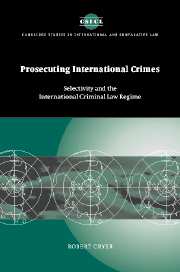Book contents
- Frontmatter
- Contents
- Preface and acknowledgements
- Table of cases
- Table of treaties
- List of abbreviations
- Introduction
- Part I The development of the international criminal law regime
- 1 The development of international criminal law
- 2 International criminal law: State rights, responsibilities and problems
- 3 International Criminal Tribunals and the regime of international criminal law enforcement
- Part II Evaluating the regime
- Conclusion
- Select bibliography
- Index
- CAMBRIDGE STUDIES IN INTERNATIONAL AND COMPARATIVE LAW
3 - International Criminal Tribunals and the regime of international criminal law enforcement
Published online by Cambridge University Press: 06 July 2009
- Frontmatter
- Contents
- Preface and acknowledgements
- Table of cases
- Table of treaties
- List of abbreviations
- Introduction
- Part I The development of the international criminal law regime
- 1 The development of international criminal law
- 2 International criminal law: State rights, responsibilities and problems
- 3 International Criminal Tribunals and the regime of international criminal law enforcement
- Part II Evaluating the regime
- Conclusion
- Select bibliography
- Index
- CAMBRIDGE STUDIES IN INTERNATIONAL AND COMPARATIVE LAW
Summary
Chapter 2 was in part dedicated to discussion of some of the problems related to the repression of international crimes by national courts. This chapter is intended to complete the picture of the regime of international criminal law enforcement as it exists in the twenty-first century, and the mechanisms that have been employed to attempt to transcend the problems mentioned above. As a result, there will be little discussion in this chapter of the Nuremberg and Tokyo IMTs: the two IMTs sat in the countries where the defendants were found, and as the convening powers of those tribunals had control over all the relevant areas the practical problems discovered in chapter 2 were of less relevance.
This chapter will thus seek to build upon the discussion of the problems identified in chapter 2 and discuss the manner in which the ICTY, ICTR and the ICC respond to the difficulties that have been identified in what might be termed the ‘bilateral enforcement mechanisms’ for dealing with violations of international criminal law. As we saw, it has not proved very effective. The practical problems relating to the use of extraterritorial jurisdiction apply to all the more recent international criminal tribunals, as all the trials occur outside the locus delicti; almost every piece of evidence and every defendant has therefore to be supplied by, or through the medium of, States.
- Type
- Chapter
- Information
- Prosecuting International CrimesSelectivity and the International Criminal Law Regime, pp. 124 - 188Publisher: Cambridge University PressPrint publication year: 2005



